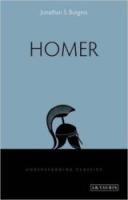
I.B. Tauris (2015) p/b 209pp £12.99 (ISBN 9781848858633)
This volume appears in the estimable ‘Understanding Classics’ series from I.B. Tauris, aimed at those preparing students for the Homeric content of GCSE and A level (linguistic and non-linguistic) and undergraduates but suitable for a wide general audience too. Briefly, it gathers together and summarises the best of Homeric scholarship from antiquity to the present day (including M.L. West’s invaluable The Epic Cycle [2013] which discusses the fragments of other epics).
B. looks at background and content of the epics, and then, about halfway through, turns his attention to The Homeric Question, Theory and Reception. This is where the reader’s brow might begin to knit. For a start, theory always has been, is, and shall continue to be associated with the f-word (fashion). Theory also tends to be (to me, anyway) complicated. Whilst one theory will uncover gems of comprehension that another might miss, I can see that the reader, unaided, could get pretty anxious about interpreting Homer. There are, after all, more theories than you can shake a stick at, so which should you (not) pursue? Further, the meta-language of theory can be quite daunting, and the last thing we need is to set up barriers to appreciation.
But B. is up to the task of clarification. He brilliantly subjects two passages, Hector and Andromache, and Polyphemus, to examination by a range of theories. And then, in his final chapter on reception (an enjoyable trot through, amongst other things, the novels and movies that draw on the epics), he uses the same passages to consider the understanding that different generations have brought to them.
This book, with its copious notes and a generous bibliography, serves a real purpose and will be welcome to students and interested Homerists alike.
Adrian Spooner
